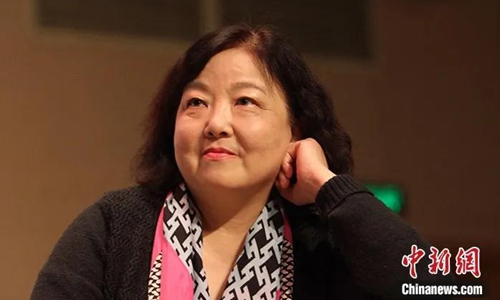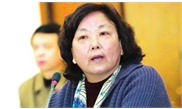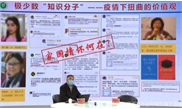Author of Wuhan Diary faces new wave of backlash after being picked as one of 100 influential women by BBC

Fang Fang File Photo: Chinanews.com
Fang Fang — the author of Wuhan Diary — is facing a new wave of backlash online, just half a year after the overseas publication of her daily accounts on Wuhan residents' lives under lockdown was slammed for only exposing the "dark side" of the city which soon became a handy tool for the West to sabotage Chinese people's efforts in fighting COVID-19.
A swarm of Chinese netizens flooded the writer's Sina Weibo account to mock her for "being really busy." After she was named as one of the 100 inspiring and influential women around the world in 2020 by the BBC, together with Hong Kong secessionist leader Agnes Chow, to people's surprise, Fang Fang did not feel shame, but proud, they said.
The "pride" they referred to means that Fang Fang embraced the award and frequently accepted interviews by foreign media to attack the Chinese government for "concealing the truth" about the city's epidemic situation.
The stories later published by Western media enraged Chinese netizens, scholars, as well as Wuhan locals, with many saying that being a "crazy woman" cannot gain her any real fame but only serves as another handy tool for anti-China forces in the West to frame China as an evil actor.
With WHO experts visiting Wuhan to trace the origin of the coronavirus, Chinese netizens believed it was not a coincidence that Fang Fang would receive wide coverage in Western media. In fact, many online said it was "pathetic" and "detestable" for her to be a "perjury" in the planned ring-fence.
But others believe it is understandable for a writer to make such moves for personal fame or wealth and Chinese society should be inclusive to different voices.
Handy political tool
On Tuesday, world-renowned Spanish journal Cambio 16 published an "exclusive" interview with Fang Fang, claiming her diary faces "a storm of censorship in China." Fang Fang's quotes have also been used as "evidence" to connect the coronavirus with the Wuhan lab leakage theory.
The article was published on the same day that BBC covered a long story that portrayed Fang Fang as a resilient figure unafraid of speaking the truth.
In the story, Fang Fang said it's very difficult for her to understand Chinese netizens' hatred as her records are "objective" and "mild" and the reason why her books were shunned by Chinese publishers was that maybe she expressed more sympathy for ordinary people than applauding the government, making her feel guilty.
"It has become common for Western media to use Fang Fang's perjury to attack China. This keen interest in perjury deepened as the COVID-19 crisis escalated in the West," said Zhang Yiwu, a professor at Peking University.
"They do not care about the truth or the efforts that China has gone to, nor the sacrifices that normal Chinese people have made. To them, Fang Fang's quotes and her diary are vivid examples that turn China's effective response into a horrible crackdown," Zhang told the Global Times.
It is also what Western politicians need to divert the public's opinion as their countries continue to be plagued with COVID-19. They've failed to learn lessons from Wuhan's lockdown and mounting voices are calling for a similar investigation by the WHO in other countries, Chinese observers said.
In China, Fang Fang has become a bizarre clown; however, for anti-China forces, she is seen as a "first-hand witness" that can be brought out to attack China, a key role in proving the origin of the virus was a laboratory in China, and a key tool that can be used whenever to implicate the Chinese government, especially as the WHO continues its work in Wuhan, Zhang said.
In the interview with the BBC, Fang Fang insisted that China's figures in the epidemic were faked and accused the Chinese government of not being responsible enough.
In fact, before April, more than 3,000 officials from upper and grassroots levels in China had been dealt with. China has also thoroughly reflected on the country's loopholes in early anti-epidemic reporting systems and formulated public health regulations and laws that cover a wide range of spheres.
"On the contrary, more than 400,000 people have died in the US. Who is blamed besides the whistler? What kind of reflections has the US government made," Chinese netizens asked.
Responding to questions and criticism, Fang Fang said on her Weibo that she did not say anything "anti-China" and her interviews were not related to the WHO's work in Wuhan. She said she was politically framed.
Half-truths are worse than a lie
Over the past months, Fang Fang has never stopped venting her condemnation of the country's far-left forces on her Sina Weibo account. She believes the far-left ideological trend that brews in the country is the reason why she was besieged by public opinion. However, critics of Fang Fang are just ordinary netizens.
A journalist in Wuhan who has been following Fang Fang's works for years and talked with the Chinese writer told the Global Times on the condition of anonymity that she is a woman of subtle and deliciated feelings about the city, about its people. When the city first locked down, when many people didn't have access to information about what was happening, her articles documenting people's lives under lockdown became a comfort to many, to some extent.
However, in many of her diary entries, there was a strong sense of being hyper-critical, the journalist described. For example, Fang urged the public to not remain silent, as collective silence is the most horrifying thing possible to her. She also cried for local doctor Li Wenliang, saying the whole city was crying for him; and ran with headlines like "wait until the lockdown is lifted, tell people what's going on," which all underscored a strong sentiment of grief, indignation and resentment.
"Our society needs different voices," the journalist said. "Even though her motivation is out of personal interest, it's understandable."
Looking back at what Wuhan has gone through over the past year, Chen Xingxu, founder of the Wuhan 520 Volunteer Alliance, felt upset about Fang Fang's recent interviews.
"How dare you call hearsay the truth? Have you ever moved a body of the deceased? Have you ever transferred patients infected with the coronavirus? Have you ever been to a hospital and talked to a doctor face-to-face? Have you called or texted even one patient? Have you ever delivered a loaf of vegetables to another community?" Chen rhetorically asked.
"These are what we, as volunteers, managed to do. We didn't sit on our hands and talk rubbish as bystanders. We practiced our oath in person. On the internet, talking is often more popular than taking action. But in the battle against the coronavirus, only action brings meaningful change to the world; empty talk is meaningless," Chen said.
On Amazon, Fang Fang's Wuhan Diary is still being sold for $15.99. The diary has so far received polarizing views from its readers.
"This diary provides a window into what it was like to live in a city that the whole world was watching," said a reader from the US.
A comment saying "half-truths are worse than a lie" ranked on top with 360 likes.
Another reader from the US suggested they do not waste their money as it was "poorly written, lacks details, insight and depth. More like blogs than personal diary entries. An opportunistic attempt to gain fame and money out of a pandemic situation."




